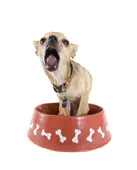 |
 | 
|
Puppy WormsTreat Worms Quickly and Carefully for Puppy HealthPuppy worms are quite common but easy to treat. Puppy health is important; treat sick puppies early. Confirm worms with your vet before treatment as wormers may cause dog poisoning in healthy pups. Dealing with puppy worms is a normal part of being a new pet owner; and is a common puppy health concern. A lot of puppies have worms, with a number having been born with roundworms in particular. The good news is that most often puppies do not get extremely ill from worms (with a few exceptions). Sick puppies need to go to the veterinarian and be treated for worms or whatever condition is making them ill. Be aware that puppies are often more vulnerable in their first year; just like human babies, their immunity and resistance isn't built up yet. Puppy Worms 101Worms are a common parasite in a dogs digestive system, and they can also show up in the heart. The various types of worms a puppy may have, besides roundworms, include whipworms, hookworms, and tapeworms. The biggest threat to puppies from worms is that they consume all the good vitamins and minerals your dog needs to grow. Worse, worms multiply fast so you need to treat worms early to prevent their spread. Sick Puppies - TreatmentPuppies normally get treated by the breeder and/or your vet at a very early age; it is often a preventative measure. While you can buy products without a prescription, many of these arent effective or, even worse, may have bad side effects in a pup with a compromised immune system (sometimes resulting in dog poisoning symptoms). If you are concerned about your puppy's health for any reason, that it to the vet. It is always better to be over-cautious, then to have serious illnesses go untreated. Recognizing Symptoms - Puppy WormsEach type of worm in a dogs system produces some signs for which you can watch. Roundworms, for example, often create a distended stomach. Other symptoms include dull fur and the overall appearance of malnourishment. Roundworms may also cause diarrhea and vomiting. Note that roundworms can be transmitted to humans if proper health protocols arent maintained. Tapeworms most often come from fleas. Sometimes you notice something that looks like a little white slip (a worm crawling out) on the dogs bottom, but most often these are hard to detect. If you notice rice-like bits (worm egg packages) in your dogs elimination, thats another sign. Hookworms come in several forms and, unfortunately, this is also a worm that humans may contract, particularly if they go barefoot in the yard where the puppy eliminates. A puppy with hookworms may become anemic and have diarrhea. As with other worms, specific diagnosis must come from a vet. Dangerous HeartwormsWhereas other puppy worms are usually not terribly dangerous if treated properly, heartworms are very dangerous and potentially fatal. Mosquitoes carry the heartworm larva and transmit when they bite a dog. Inside the puppy or dog, the worms will grow and multiply, attacking the heart and the arteries in the lungs. Symptoms of this disease in your puppy may take a while to present: first a cough, then lack of energy, signs of exhaustion, weight loss, in your previously active pet. Eventually, if left untreated and/or undiagnosed, your dog may cough up blood and breathing becomes difficult. Survival of your pet really relies on early treatment and diagnosis by a trained veterinarian, but even then many dogs may not survive this attack. You can take preventative action by using a year-round heartworm prevention treatment that you can get from your veterinarian. Vets will provide you with heartworm prevention when your dog is young to avoid very costly treatment after heartworms get contracted. Using flea and tick controls also helps. De-Worming ReactionsAfter puppy worms have been treated for less severe worm cases (that is, not heartworm), some dogs have been known to have mild reactions to the medications (if the dog did not have worms but was given a de-worming medication, it may result in dog poisoning or over-dosing). Most often the pup may seem to lack an appetite, become lethargic, or have an upset stomach. This only lasts about 1 day. If these problems continue longer than that, please contact your vet for advice. Taking Care of Your PupIn addition to making sure that you check for, and treat, worms seriously, you also need to ensure that your puppy is properly cared for. You will need to brush her/his coat regularly and brush your pet's teeth frequently (every day if possible, if not at least three times a week). Also check your pup's ears and clean them. Once your puppy starts going outside check the paw pads and nails regularly. Nails will need to be clipped; have your veterinarian show you how to do it yourself (if you want to - this does require skill and technique - especially for dark colored nails). And use a healthy, herbal flea repellent shampoo for your pup; we recommend PetAlive BeFree Flea Shampoo, which helps deter fleas, flies and mosquitoes for dogs. Return to The Dog Biscuit Home Page. |       Related Articles
Each of these articles provides you with puppy information.
New Puppy Care Pet vaccines, neutering/spaying, check-ups, and more. How to Train a Puppy? Puppy training 101. House Training a Puppy Successfully training your new puppy - it's possible! Housebreaking a Puppy Your puppy needs to learn; housebreaking. Puppy Teeth: Dental Care Chewing and biting are normal symptoms of teething. Puppy Weight Estimates Are you able to estimate the potential weight of your pup at full growth? Puppy Worms: Treat Early Your pup's health is important; be aware of sick puppy symptoms and causes. | |
|
Enjoy This Site?
Then why not use the button below, to add us to your favorite bookmarking service?    | ||
|
| Home | About
| Contact | Sitemap
| What's New
|Privacy Policy |
This site is for informational purposes only. If you have an issue with your dog's health, please see your vet.
Website design by Webmidwife.com | ||
| | ||







